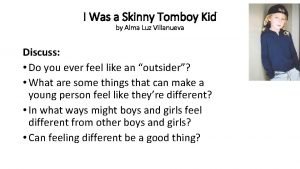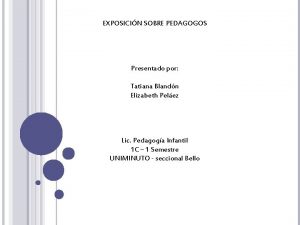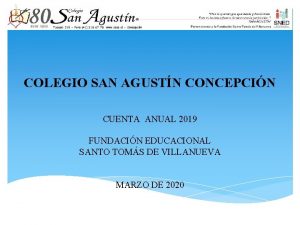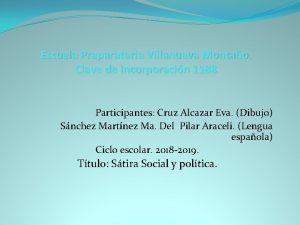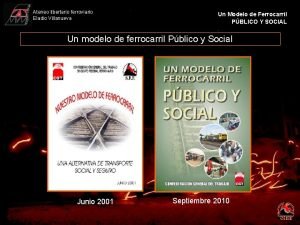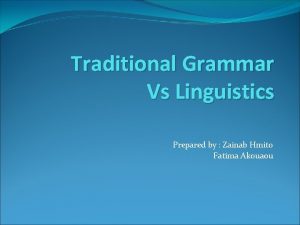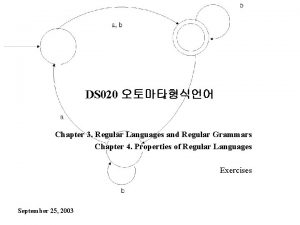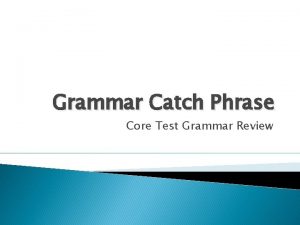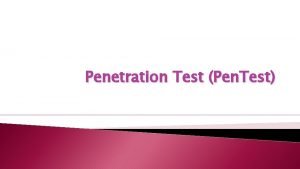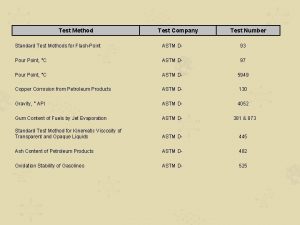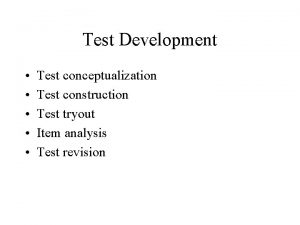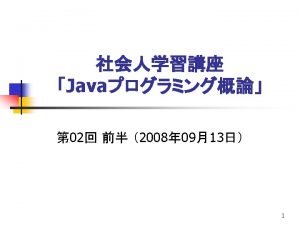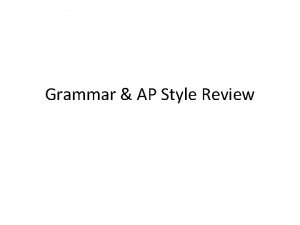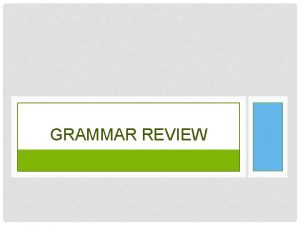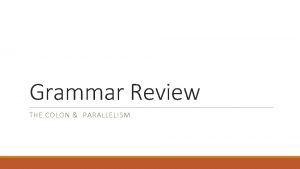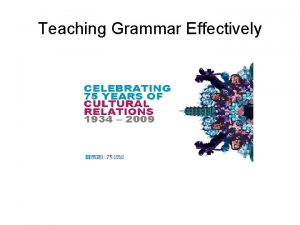Grammar Mr Villanueva Grammar Review The test will













- Slides: 13

Grammar Mr. Villanueva

Grammar Review The test will not ask you directly about the “parts of speech”, but they are important in order to understand • • Noun: person, place, or thing (dog, New York, OFL) Verb: action word (talk, study, run) Adjective: word that describes (happy, bright, fast) Adverb: a word that modifies a verb, an adjective, another adverb; usually ends in ‘-ly’ (happily, very, slowly) • Subject: the subject is the part of the sentence • (usually a noun) that performs the action. (she gave me the book; the dog slept) Predicate: the part of the sentence that is not the subject (she gave me the book; the dog slept) Subject+ Predicate=complete sentence

Clauses • A clause is a group of words that has a verb and a subject. Some are complete sentences, but others need to be linked to another clause to make sense. – Independent (Main) Clause: a complete thought, and can stand alone as a sentence or be linked to another clause. • Exp: People had to keep a fire going all the time. – Dependent (Subordinate) Clause: does not express a complete idea, so it has to be linked to the independent clause. • Exp: Before matches made it easy to start a fire Complete sentence using both types of clauses: Before matches made it easy to start a fire, people had to keep a fire going all the time.

Grammar Review: Punctuation • Semicolon: used between independent clauses without • Semicolon: used between independent clauses without conjunctions (for, and, nor, but, or, yet, so— F. A. N. B. O. Y. S. !!!) Exp: Fire is our good friend; fire is our deadly enemy. • Colon: used between independent clauses when the second clause explains the first or provides a list. Exp: Fire is important: it heats our home and our food. • Ellipses: three spaced dots, show that something has been omitted (left out) Exp: The firefighter said, “It’s really dangerous…but we have the blaze under control. ” • Hyphen: Used in some compound adjectives, numbers, and prefixes. Exp: The well-organized squad of twenty-four firefighters are pro- American.

Practice • Write a sentence using a colon • Write a sentence using ellipse • Write a sentence using hyphen • Make sure to use it correctly, we will share in class

Grammar Review: Sentence construction and usage • Parallel structure • Subordination • Proper placement of modifiers • Consistency of tenses

**Reminder: Consistency of tenses** • This is a common CAHSEE subject • For questions about sentence construction, they will commonly put something like the example: “he rushed into the house and closes the door in my face” • What is wrong with that sentence?

**Consistency of tenses (cont. )** • All verbs in a sentence must be in one tense. It is incorrect to go back and forth between past, present, and future. • The example could be changed to either: – “he rushed into the house and closed the door in my face” (past) OR – “he rushes into the house and closes the door in my face” (present) • Don’t forget: the tense needs to be consistent (the same) throughout a sentence.

Practice • Write a sentence about what you did last weekend. • It should have at least 2 verbs in the sentence • Use the same tense in the entire sentence.

Grammar Review: Proofreading • Usage • Structure • Diction • Grammar • Mechanics

**Reminder: Noun/Verb Agreement** • Subjects and verbs must always “agree” in a sentence. • For example, the following sentence has an agreement issue: – Frank and Sabrina is the two students who have books. What is wrong with this sentence? What does not “agree”?

**Noun/Verb Agreement (cont. )** • There are two students (Frank and Sabrina), so • • the verb should be plural (are instead of is) The correct sentence would be: “Frank and Sabrina are the two students who have books. ” When you see this on the CAHSEE, often there will be a trick to figuring out singular vs. plural. For example, the following words are singular even though they refer to a group: class, group, team, etc.

Practice • Write one sentence with a plural subject • Write one sentence with a singular subject • We will be sharing in class
 Fr maximo villanueva
Fr maximo villanueva I was a skinny tomboy kid summary
I was a skinny tomboy kid summary Capilla san fermin
Capilla san fermin Juan jerónimo godoy villanueva
Juan jerónimo godoy villanueva Colegio santo tomas de villanueva
Colegio santo tomas de villanueva Preparatoria villanueva
Preparatoria villanueva Culdocentesis
Culdocentesis Alcaldia de villanueva santander
Alcaldia de villanueva santander Eladio villanueva
Eladio villanueva Unit test review algebra 2
Unit test review algebra 2 Left linear to right linear grammar
Left linear to right linear grammar Advantages of traditional grammar
Advantages of traditional grammar Chomsky hierarchy of grammars
Chomsky hierarchy of grammars Right linear grammar
Right linear grammar

